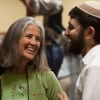When something breaks, the question may arise, repair it, or get rid of it and buy a new one?


When something breaks, the question may arise, repair it, or get rid of it and buy a new one?

Jewcology is a diverse platform for Jewish environmental activists to learn from each other in order to educate Jewish communities about our responsibility to protect the environment. Hazon is excited to share these resources with you! We promote the interrelatedness of shabbat as a time to reflect on environmental and sustainable ideas through many of our programs and resources. Our Food Guide has kosher sustainable meat options, Greening Your Shabbat Table, Sustainable Kiddush, and all of our Food Programs help you to draw connections between Jewish tradition and contemporary food issues. By Rabbi Yonatan Neril In modern society, we are running, speaking, and thinking at an exceptional rate, and oftentimes we continue all week long without slowing down. Constantly doing, always mobile accessible, habitually multi-tasking. If being too busy is a malady of modern man, slowing down on Shabbat may be a key remedy. The Torah teaches, “These are the things that the Divine commanded to make. Six days work may be done, but on the seventh day you shall have sanctity, a day of complete rest to G-d…” Achieving sanctity and complete rest is the stated goal of Shabbat. Yet how can this happen? (more…)

Jewcology is a diverse platform for Jewish environmental activists to learn from each other in order to educate Jewish communities about our responsibility to protect the environment. Hazon is excited to share these resources with you! We work to create a healthier and more sustainable Israel through our Israel Ride, our Sustainable Food Tour, and Siach (conversation). Learn more about sustainability in the land of Israel using this resource from Jewcology: By Rabbi Yonatan Neril Abraham and Sarah came to Israel over 3700 years ago. Since then, significant populations of Jews have spent over 1600 years living in the Land of Israel. For much of this time, Jews have been involved in growing crops, tending fruit trees, and shepherding animals, activities critical to providing food to sustain those living in Israel. Yet they also presented challenges to environmental sustainability in the Land. How did Jews manage to live in the Land for so long? While the Torah teaches that Divine Providence (in response to the people following the commandments) played the fundamental role, the Oral Tradition as redacted in the Mishna also provides insights. (more…)
![Tu B’Shvat on Your Terms [Round Up 2/2/2012] fruit-and-wine](https://hazon.org/wp-content/uploads/2012/02/fruit-and-wine-100x100.jpg)
Tips for the holidays and events near you
